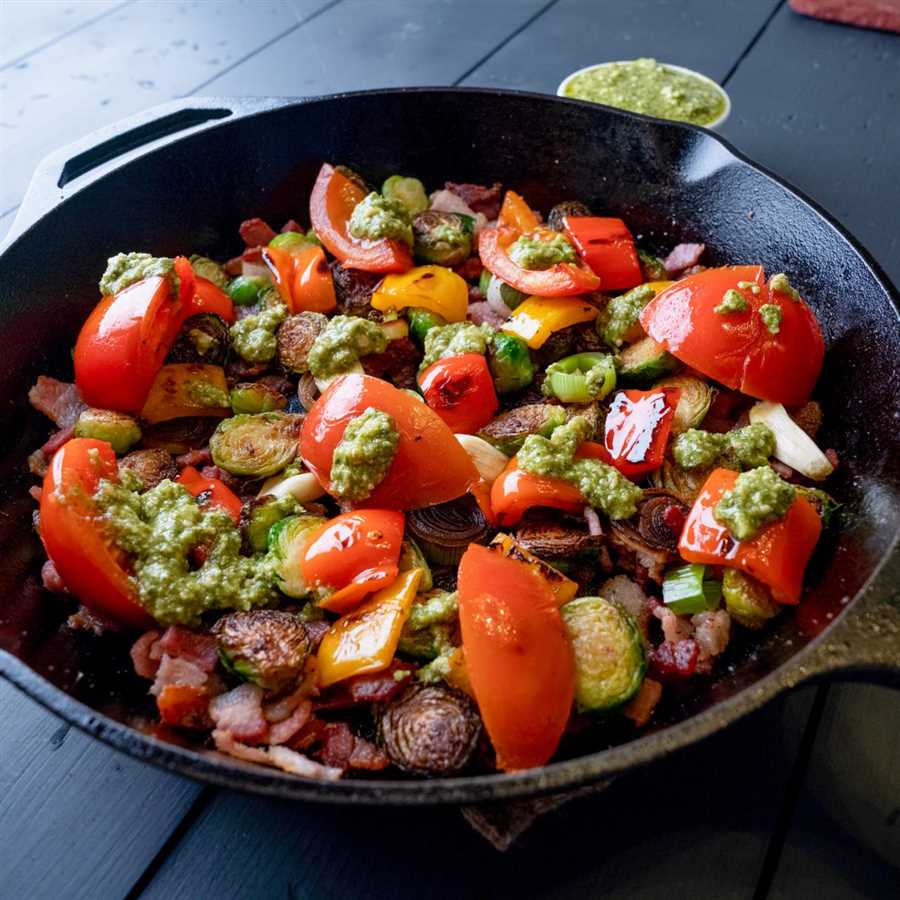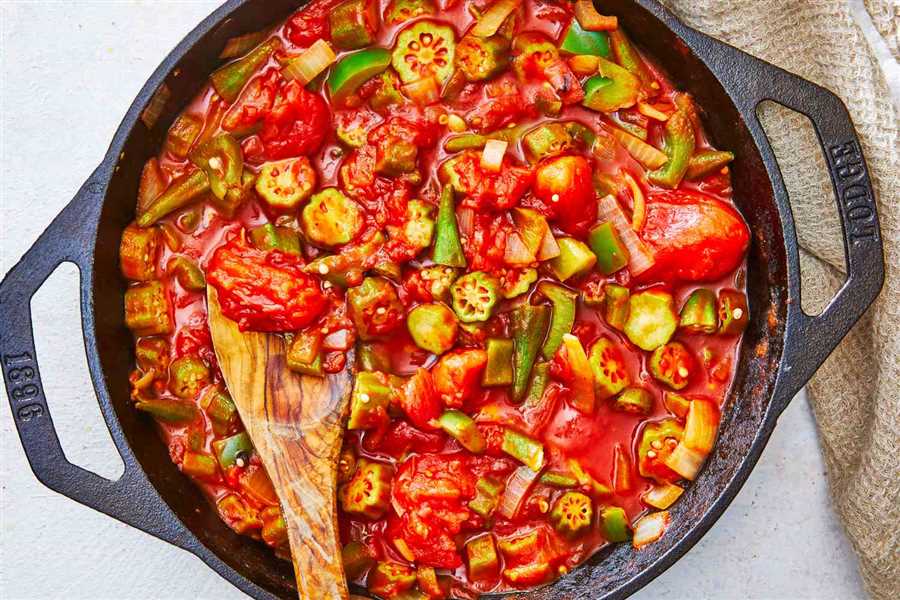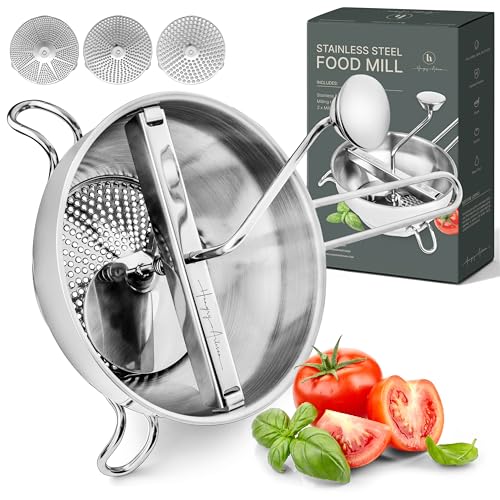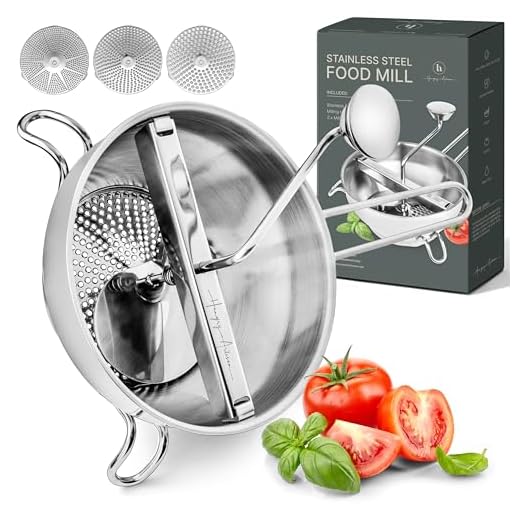



Cast iron cookware has been used for centuries, known for its excellent heat retention and even heat distribution. It is a staple in many kitchens and is often used for cooking a variety of dishes. However, when it comes to acidic foods such as tomato sauce, there is some debate about whether it is safe to cook them in cast iron.
The concern stems from the fact that the acidity of tomatoes can react with the iron in the cast iron, potentially leaching small amounts of iron into the food. Some believe that this can alter the taste of the tomato sauce and even be harmful to health. Others argue that the amount of iron leached is minimal and within safe limits.
To address this concern, many manufacturers now produce enamel-coated cast iron cookware, which provides a barrier between the iron and the acidic food. This eliminates any potential reaction and allows for safe cooking of tomato sauce and other acidic dishes in cast iron.
However, if you are using traditional uncoated cast iron cookware and still want to cook tomato sauce, there are a few precautions you can take. It is recommended to season your cast iron cookware before use, as this creates a natural non-stick surface and helps make it more resistant to acidic foods. Additionally, it is advised to avoid storing acidic foods in cast iron for prolonged periods of time, as this can increase the chances of leaching.
Overall, while there is some debate about cooking tomato sauce in cast iron, it is generally considered safe as long as you take necessary precautions. Enamel-coated cast iron is a popular choice for those concerned about the potential reaction between the acidity of tomatoes and the iron. However, if you properly season your traditional cast iron cookware and avoid prolonged storage of acidic foods, you can still enjoy delicious tomato sauce cooked in cast iron.
Benefits of Cooking Tomato Sauce in Cast Iron
The use of cast iron cookware for making tomato sauce offers several benefits.
1. Superior heat retention: Cast iron has excellent heat retention properties, which allows it to heat up evenly and hold heat for a long time. This is particularly beneficial when cooking tomato sauce, as it requires slow and steady heating to develop rich flavors. The even heat distribution helps to prevent hot spots and ensures that the sauce cooks consistently.
2. Enhanced flavor: When tomato sauce is cooked in a cast iron pan, it can develop a deeper and more complex flavor profile. The natural acidity of tomatoes can react with the iron in the pan, resulting in a slightly sweet and tangy taste. This reaction doesn’t occur with other types of cookware, making cast iron uniquely suited for cooking tomato-based dishes.
3. Versatility: Cast iron cookware is highly versatile and can be used for various cooking methods, including stovetop, oven, and even outdoor grilling. This means you can start your tomato sauce on the stovetop and finish it in the oven if desired. It also means that you can easily transfer the sauce from the stovetop to the table, as cast iron is often used as a serving dish.
4. Durability: Cast iron cookware is known for its durability and longevity. With proper care, a cast iron pan can last for generations. This makes it a cost-effective choice for cooking tomato sauce, as you won’t need to worry about replacing it frequently.
5. Non-stick properties: When properly seasoned, cast iron develops a natural non-stick surface. This makes it easier to cook tomato sauce without worrying about it sticking to the pan. It also makes cleanup a breeze, as food particles are less likely to stick to the surface.
Overall, cooking tomato sauce in cast iron offers a range of benefits, from superior heat retention to enhanced flavor. Whether you’re a seasoned chef or a home cook, incorporating cast iron into your cooking routine can elevate the taste and quality of your tomato sauce.
Enhanced Flavour and Aroma
When you cook tomato sauce in a cast iron pan, you can expect an enhanced flavour and aroma compared to other cookware materials. This is because cast iron is known for its ability to retain and distribute heat evenly throughout the cooking process.
The even heat distribution allows the tomato sauce to simmer and develop its flavors slowly. As a result, the sauce becomes richer and more complex. The porous nature of cast iron also allows it to absorb some of the flavors from the sauce, further enhancing its taste.
Additionally, the high heat retention of cast iron helps to caramelize the natural sugars in the tomatoes, intensifying the sweetness and depth of the sauce. This caramelization process also creates a slightly smoky and charred flavor that adds a unique element to the overall taste profile.
Benefits of Cooking Tomato Sauce in Cast Iron:

- Enhanced flavor and aroma
- Richer and more complex sauce
- Ability to absorb flavors
- Intensified sweetness and depth
- Unique smoky and charred notes
In conclusion, cooking tomato sauce in a cast iron pan can greatly enhance its flavor and aroma. The even heat distribution and high heat retention of cast iron allow the sauce to simmer and develop its flavors slowly, resulting in a richer and more complex sauce. Additionally, the porous nature of cast iron allows it to absorb flavors and the caramelization process intensifies the sweetness and introduces smoky and charred notes to the sauce. Give it a try and experience the difference for yourself!
Improved Heat Distribution

One of the advantages of cooking tomato sauce in a cast iron pan is its improved heat distribution. Cast iron is known for its ability to hold and distribute heat evenly, allowing for consistent cooking results.
When cooking tomato sauce, heat distribution is essential to ensure that the sauce cooks evenly and doesn’t stick to the pan. The even heat distribution provided by a cast iron pan helps to prevent hot spots and allows the sauce to cook more evenly.
Unlike other types of cookware that may have uneven heat distribution, a cast iron pan evenly distributes heat across its surface and retains heat for longer periods. This means that the tomato sauce will cook consistently, preventing any part of it from being undercooked or burned.
Furthermore, the superior heat retention of cast iron helps to keep the sauce warm for a longer time once it’s cooked. This is especially beneficial if you’re serving the sauce as a topping or a side dish and want to keep it at a desirable temperature.
Conclusion
Cooking tomato sauce in a cast iron pan offers improved heat distribution, ensuring that the sauce cooks evenly and preventing it from sticking to the pan. The even heat distribution and superior heat retention of cast iron make it an excellent choice for cooking tomato sauce, resulting in delicious and perfectly cooked sauce every time.
Retained Nutritional Value
Cooking tomato sauce in cast iron helps to retain the nutritional value of the ingredients. Cast iron is a great conductor of heat, allowing for even heat distribution and retention. This means that when you cook tomato sauce in a cast iron pot or skillet, the ingredients will cook evenly and at a consistent temperature.
Tomatoes are packed with vitamins and minerals, such as vitamins A, C, and E, as well as potassium and lycopene. These nutrients are essential for a healthy diet and can provide numerous health benefits. Cooking tomato sauce in cast iron helps to preserve these nutrients, ensuring that you get the maximum nutritional value from your sauce.
Additionally, cooking tomato sauce in cast iron helps to enhance the flavor of the sauce. The iron from the cast iron can react with the acidic tomatoes, creating a unique and rich flavor profile. This can make your tomato sauce taste even more delicious and satisfying.
It’s important to note that the acidity of tomatoes can cause a reaction with cast iron, especially if the cast iron is not properly seasoned or if it is a newer pan. This can lead to a metallic taste in the sauce and can even darken the color. To prevent this, it’s recommended to use a well-seasoned cast iron pan or skillet when cooking tomato sauce.
In conclusion, cooking tomato sauce in cast iron is a great way to retain the nutritional value of the ingredients and enhance the flavor of the sauce. By using a well-seasoned cast iron pan or skillet, you can ensure that your tomato sauce turns out delicious and packed with nutrients.
Non-reactive Surface
When cooking tomato sauce in a cast iron skillet, it is important to consider the reactivity of the surface. Tomato sauce is acidic and can react with certain types of cookware, causing a metallic taste and discoloration of the food.
Cooking tomato sauce in a cast iron skillet can be problematic because cast iron is a reactive material. The acid in the sauce can react with the iron, leaching a metallic flavor into the sauce. This can affect the taste of the dish and may also cause the sauce to turn a dark, unappetizing color.
To avoid these issues, it is recommended to use a non-reactive surface when cooking tomato sauce. Non-reactive cookware, such as stainless steel or enameled cast iron, does not interact with acidic ingredients, allowing the sauce to cook evenly and retain its natural flavor. These types of cookware are also easier to clean and maintain.
Non-reactive surfaces provide a stable cooking environment for tomato sauce and other acidic foods. They ensure that the flavors of the ingredients are preserved and that the sauce maintains its vibrant color. Additionally, non-reactive cookware allows for better heat distribution, preventing hot spots and promoting even cooking.
So, while cast iron is a versatile and durable material for many cooking tasks, it is not recommended for cooking tomato sauce. Instead, opt for a non-reactive surface to ensure the best results and a delicious sauce every time.
Questions and answers
Is it safe to cook tomato sauce in a cast iron pan?
Yes, it is safe to cook tomato sauce in a cast iron pan. Cast iron pans are known for their durability and ability to evenly distribute heat, making them a great choice for cooking tomato sauce.
Will cooking tomato sauce in a cast iron pan affect the taste?
Cooking tomato sauce in a cast iron pan can actually enhance the flavor. The cast iron can help to develop a rich, deep flavor in the sauce, making it even more delicious.
Can tomato sauce stain a cast iron pan?
Tomato sauce can potentially stain a cast iron pan if it is not properly seasoned or cleaned. However, with regular maintenance and care, any staining can be minimized or avoided altogether.
Should I use a specific type of cast iron pan to cook tomato sauce?
No, you can use any type of cast iron pan to cook tomato sauce. Whether it’s a skillet, dutch oven, or any other type of cast iron cookware, they will all work well for cooking tomato sauce.
Are there any special precautions I should take when cooking tomato sauce in a cast iron pan?
When cooking tomato sauce in a cast iron pan, it is important to avoid using excessive heat, as this can cause the sauce to burn or stick to the pan. It is also recommended to stir the sauce regularly to prevent it from sticking. Additionally, make sure the cast iron pan is properly seasoned and cleaned to avoid any potential staining.







